I live on a dirt road, some would say in the middle of nowhere, but in reality, Brown Hill is somewhere. With three different towns and school districts merging in our small community, we are a mismatch of different types of people, some come here for the farming, others for the cheap real estate, and others because their families have always been here and will continue to always be here.
I leave, but I always return, to this little slice of the earth that I call my home. This small part of land in Crawford County, in the state of Pennsylvania, remains untouched by the government. They take care of us in the extent that occasionally they pay for a plow to come down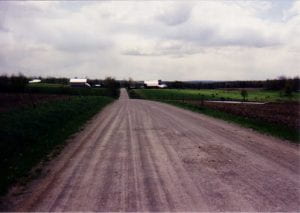 our road in the winter, and once the waters have dried up from the spring they send a grate to fill in all the potholes left over from our arduous winters.
our road in the winter, and once the waters have dried up from the spring they send a grate to fill in all the potholes left over from our arduous winters.
Other than that, they leave us alone. As Williams wrote about this community having their road wiped away and the fight of the local community to return it, I was horrified. What about the people living on that road? How would they get to work? How would they feed their families? Williams writes about the bull trout that might become extinct, but if they just repair the existing road in the first place that caused no danger to the bull trout, what would happen then.
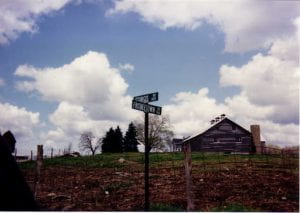 All I could think about was what if that happened in my community? If my road fell into disrepair and was washed away by the melting snows? The people who live in this small rural community do not have the money to lose to fix it themselves, they cannot afford to miss days of work because their road cannot be crossed. My heart ached for the people that are barely mentioned, who would have had to face the decision to give up their homes to move somewhere else.
All I could think about was what if that happened in my community? If my road fell into disrepair and was washed away by the melting snows? The people who live in this small rural community do not have the money to lose to fix it themselves, they cannot afford to miss days of work because their road cannot be crossed. My heart ached for the people that are barely mentioned, who would have had to face the decision to give up their homes to move somewhere else.
I had to question, what would my community do if this happened here? Would we stand up and fight? Or have we become so dispassionate from years of simply taking what the government gives us?
As a liberal, I am different from most in my community. I live in an area where most are uneducated and believe the lies spouting from the mouth of the President. They fly their rebel flags believing it is a sign of history, completely disregarding that Pennsylvania was in the Union and that it is not our history. The people of my community take what they are being given. They do not stand up and fight. They stand with the status quo. It is there that I realize most would not fight, most would allow the government to do what they do and convince them that this is best.
Williams talks of “a participation in public life to make certain all is not destroyed under the banner of progress, expediency, or ignorance” (Williams 19) and this is where I believe my community would fail. Most are content with what the government tells them is right and are not willing to research their beliefs to discover the best way to save themselves and their families.
In Knowing Our Place, Barbara Kingsolver writes of needing wilderness in her life and I recognize that. I bounce around Western Pennsylvania, spending most of my adult life living in Pittsburgh, but when the ache for wide open skies, trees all around me, and the smell of manure that always reminds me of home, returns, so do I.
I grew up playing amongst the trees, with the mud in the spring, bugs in the summer, leaves in the fall, and those astoundingly large piles of snow in the winter months. The city has its benefits, but living here brings you back to your core. One must really work for the essentials, planning weekly trips two towns over for groceries, organizing homework time by the hours of the day when the internet works the best. We grow our own food that will hold us through the long winter months, and we shoot, skin and package our own meat that will supply us all year long.
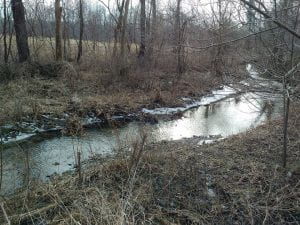 When I was young and full of rebellion I ran to the city seeking freedom from the mundane. As a woman in my late twenties I returned home to the hill where everyone knows my name. It is here I make my home, with my grandmother, where my parents and grown siblings show up unannounced on any given night to see what I have cooked for dinner. It is here where I am content to make my home.
When I was young and full of rebellion I ran to the city seeking freedom from the mundane. As a woman in my late twenties I returned home to the hill where everyone knows my name. It is here I make my home, with my grandmother, where my parents and grown siblings show up unannounced on any given night to see what I have cooked for dinner. It is here where I am content to make my home.
I can’t imagine life any other way. The city is good for a little while, but eventually, one needs to experience what life is like without daily conveniences. I became spoiled having everything at arms distance. Life was easy and I got lazy. Here I must work harder and therefore discover the woman who I truly am.
Annotated Bibliography
Kingsolver, Barbara. “Knowing Our Place.” Small Wonder, Harper Collins, 2002.
Williams, Terry Tempest. “Home Work.” Red, 2002, pp. 3–19.
Fisher, Jim. “Photos.” Amish Murder, Edinboro University, jimfisher.edinboro.edu/amish/photos.html. This website provided me with the only published photographs I could find of my neighborhood. Affiliated with Edinboro University, it is a website dedicated to the most well known murder to happen in my neighborhood during my lifetime.

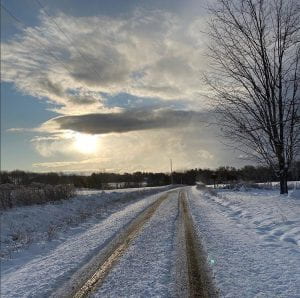
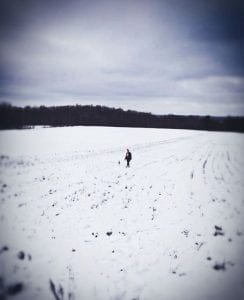
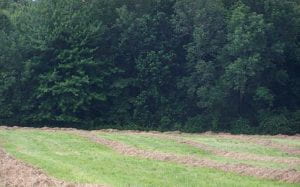
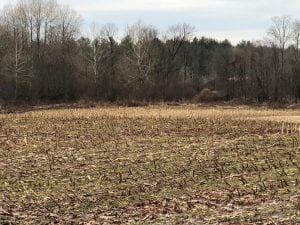
Kiera,
I love how you wrote with so much passion about where you’re from. It made me feel emotion towards it as well. You bring up such a great point about what would happen if the government made such a big change in your community. I can relate to this. I also am from a small town in Pennsylvania, except eastern. It is a mainly conservative area as well. I think a lot of my drive to go and get a liberal education in my major (women and gender studies) was due to a lot of the thought patterns I was raised around. The Williams quote you integrated, “a participation in public life to make certain all is not destroyed under the banner of progress, expediency, or ignorance” hits the nail on the head. I think that is the thought belief throughout many small towns in America. That is a big cause of a lot of the environmental despair we currently have. Many people are comfortable with however things are. If things change, they don’t want to get even more uncomfortable in order to change it. That is why classes like ecofeminism are so important. We are gaining all of this knowledge and insight that can help start conversations. I think that it can be pretty hard to change somebody’s mind on an issue or a thought pattern in a single conversation. However, I think it can be great to plant a seed.
I agree with Amanda, I too enjoyed the way you spoke about where you are from. I didn’t even think that places untouched by the government were easy or close to come by, especially being fairly close to where I’m from in Massachusetts. I wondered what it would be like if from the beginning of time we didn’t allow the governments and business’ to triumph our beautiful land. It is hard to decide what we would do or how we would go about saving land when literally the people who are in charge of laws and decisions are the ones that have say so at the end of the day. I do believe that some people especially people like your neighbors who have no desire to a different more open way of living regardless of the media or what the president has to say. Truthfully I do hope the the over compensating for our quick growing population brings us together for a better, healthier Earth.
Hello!
It sounds like you have a peaceful life in Pennsylvania. I’m interested in how you interpreted the decision to close the road the save the bull trout. The way that Williams described the locals versus the government had given an edge to the initiative to protect the bull trout on the government’s authority. But you’re right people rightfully deserve to feel very upset for being inconvenienced by losing a road they needed.
I take it that you’re upset that your community wouldn’t fight for their own interests over the ones that are environmentally conscious. I can very much relate to that attitude, as I think of how mad I would be if I had to experience an inconvenience like that be authorized to happen by an entity that is not directly affected by the outcome.
Williams urges us to be wary of sacrificing too much of our natural habitat to accommodate the evolution of our technological and industrial developments. Since the people in your town are not bothered by whatever decision is implemented by the local government, I at least hope that they make environmentally sound decisions. I understand the need to act in the interest of the community, even though their motivation might be self-centered. Should a community be given permission to destroy their surroundings? No I don’t believe so, but if they are not directly hurting others in their actions I think they should be able to make their decision to do what they want.
Hello Kiera,
I like one of the very first things you said. You said that Brown Hill is somewhere, even though many people say it’s in the middle of nowhere. I found this interesting because we often think of the wildness, for example, as being a far away place because us people who live in the city are so often disconnected from nature that we don’t realize that we are surrounded by it. I never understand when people say “in the middle of nowhere”. Often times I’ve noticed that people say it because it’s a place that they didn’t know about and because it’s also a quiet place away from the city and the chaos. From reading your post, I can take away that you have a very deep connection to nature because of the way you grew up. I also found interesting what you said about having people over unannounced and all your neighbors knowing your name. In the city, we live so busy that we don’t have time to talk to our neighbors or even spend quality time with our families. Living in a place like yours is more relaxed, I am assuming, because of how close everyone is to each other. In the city, there are millions of people and everyone is focused on themselves. Just stepping outside in the city gives you anxiety because of all the cars, the people walking everywhere, and the noise. Living in a place like yours must be peaceful and stress-relieving. When I think of the United States, I think of a capitalist, fast-paced country, so reading your post about Brown Hill impresses me because I never knew that we had places like that in this country.